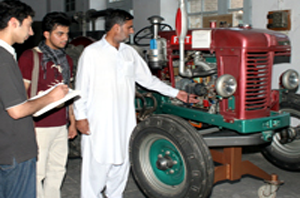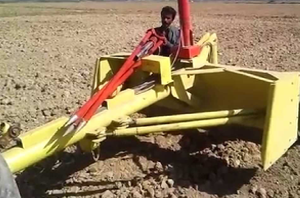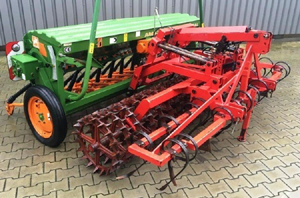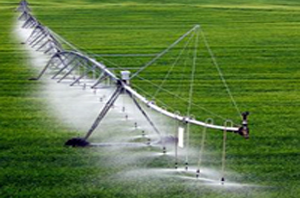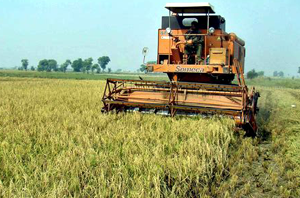Department of Agricultural Engineering Peshawar Campus
The Department of Agricultural Engineering was established in 1961 in the then College of Engineering, University of Peshawar. This Department is the pioneer in initiating Agricultural Engineering education in the country and thus has the pride of producing the first batch of Agricultural Engineers in 1965 in Pakistan. Since then, hundreds of graduates of this department are rendering their valuable services in government departments, national and international organizations throughout the world. Our graduates have been instrumental in the development of Pakistan's economy. Agricultural Engineering is the branch of Engineering that utilizes the engineering principles, materials and forces of nature for the benefit of agriculture and resultantly in the best interest of humanity. Agricultural Engineers are trained to creatively apply engineering and scientific principles in the design and development of new products, systems and processes for the conversion of raw materials and power sources into food, feed, and fiber while protecting the environment and workers health and safety. Agricultural Engineers offer their valuable services to design irrigation systems such as surface and high efficiency irrigation systems to utilize the precious waters to enhance agricultural productivity; design drainage systems to control the menaces of water-logging and salinity; design and develop strategies for flood management; develop soil and water conservation techniques for irrigated and rainfed areas; apply hydrology principles to predict and mitigate floods, landslides and drought risks; design farm structures for poultry, dairy, and storages for agricultural products; design dams and ponds for irrigation water supply; modify agricultural features by landscaping techniques; perform agricultural product processing, and environmental impact assessment; design new and improved farm machinery for agricultural mechanization; utilize different techniques of renewable energies to generate power for agricultural needs; apply geographic information system and remote sensing techniques to agricultural research; interpret research output, and implement relevant schemes. In general, they combine physical sciences with biological sciences and solve engineering problems related to agriculture.
Faculty & Staff of Agricultural Engineering Peshawar Campus
The mission statement of the Bachelor of Science in Agricultural Engineering is presented below:
"To produce Agricultural Engineers equipped with professional knowledge, skills, and ethical values for effective socio-economical solutions to complex engineering problems".
The Program Educational Objectives (PEOs)
- The PEOs were formulated in consultation with the members of the Industrial Advisory Board and the Board of Studies and subsequently approved by the Board of Faculty and the Academic Council of the University.
- The graduates are expected to the attain the PEOs within few years of graduation. The graduates will:
PEO-1.
"Be highly competent to establish themselves as practicing professionals in a broad range of career opportunities in public and private sectors at national and international level."
PEO-2.
"Be able to pursue advance studies and seek continuous professional development to remain competitive."
PEO-3.
"Become responsible citizens with high ethical and professional values and be aware of the societal and environmental issues."
Program Learning Outcomes (PLOs)
- The following twelve graduate attributes have been defined for the program as per PEC-OBE Manual 2014:
1. Engineering Knowledge
An ability to apply knowledge of mathematics, science, engineering fundamentals and an engineering specialization to the solution of complex engineering problems.
2. Problem Analysis
An ability to identify, formulate, research literature, and analyze complex engineering problems reaching substantiated conclusions using first principles of mathematics, natural sciences and engineering sciences.
3. Design / Development of Solutions
An ability to design solutions for complex engineering problems and design systems, components or processes that meet specified needs with appropriate consideration for public health and safety, cultural, societal, and environmental considerations.
4. Investigation
An ability to investigate complex engineering problems in a methodical way including literature survey, design and conduct of experiments, analysis and interpretation of experimental data, and synthesis of information to derive valid conclusions.
5. Modern Tool Usage
An ability to create, select and apply appropriate techniques, resources, and modern engineering and IT tools, including prediction and modelling, to complex engineering activities, with an understanding of the limitations.
6. The Engineer and Society
An ability to apply reasoning informed by contextual knowledge to assess societal, health, safety, legal and cultural issues and the consequent responsibilities relevant to professional engineering practice and solution to complex engineering problems.
7. Environment and Sustainability
An ability to understand the impact of professional engineering solutions in societal and environmental contexts and demonstrate knowledge of and need for sustainable development.
8. Ethics
Apply ethical principles and commit to professional ethics and responsibilities and norms of engineering practice.
9. Individual and Teamwork
An ability to work effectively, as an individual or in a team, on multifaceted and /or multidisciplinary settings.
10. Communication
An ability to communicate effectively, orally as well as in writing, on complex engineering activities with the engineering community and with society at large, such as being able to comprehend and write effective reports and design documentation, make effective presentations, and give and receive clear instructions.
11. Project Management
An ability to demonstrate management skills and apply engineering principles to one's own work, as a member and/or leader in a team, to manage projects in a multidisciplinary environment.
12. Lifelong Learning
An ability to recognize importance of and pursue lifelong learning in the broader context of innovation and technological developments.
- Academic Programs
- - B.Sc. Agricultural Engineering
- - M.Sc. Agricultural Engineering
- - Ph.D. Agricultural Engineering
Syllabus of Agricultural Engineering
- Laboratories The Department has the following well-equipped laboratories for practical work of students and research by the faculty members.
- - Soil and Water Engineering Laboratory - Irrigation Engineering Laboratory
- - Farm Machinery Workshop - Drainage Engineering Laboratory
- - Postgraduate Computer Laboratory - Undergraduate Computer Laboratory
- - GIS and RS Laboratory - I.C. Engine Demonstration Center
Practical Training
Apart from the academic activities, students are required to complete 800 hours of practical
training as a requirement for the award of B.Sc. Agricultural Engineering Degree. This practical
training is arranged during the summer vacations in the relevant fields of Agricultural Engineering.
Field Visits
The Department maintains close liaison with Govt. Departments and private industries
related to Agricultural Engineering. Field visits are arranged as per requirement of a particular
course. Industrial tours are also arranged in each semester to enable the students to acquire practical knowledge and skills.
Survey Camp
Each year practical training in the field of surveying and leveling is arranged for the students of 7th Semester for a period
of three weeks which is mandatory for the award of degree. The students are trained in techniques like leveling, plane tabling,
triangulation, contouring, road and irrigation channel surveys.
Research
In addition to offering academic programs, the faculty is actively engaged in applied research at national and international
levels and also providing consultancy services in the areas related to Agricultural Engineering.

